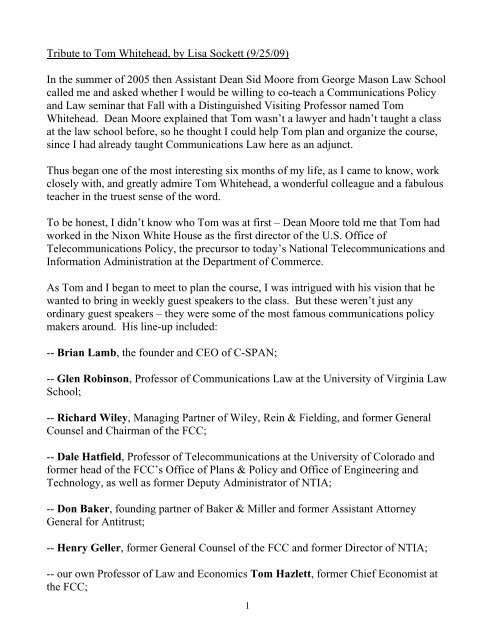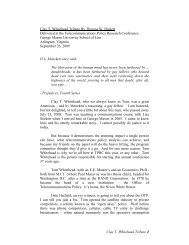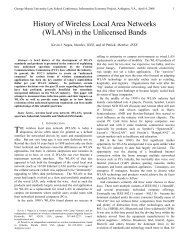Tribute to Tom Whitehead, by Lisa Sockett - Information Economy ...
Tribute to Tom Whitehead, by Lisa Sockett - Information Economy ...
Tribute to Tom Whitehead, by Lisa Sockett - Information Economy ...
Create successful ePaper yourself
Turn your PDF publications into a flip-book with our unique Google optimized e-Paper software.
<strong>Tribute</strong> <strong>to</strong> <strong>Tom</strong> <strong>Whitehead</strong>, <strong>by</strong> <strong>Lisa</strong> <strong>Sockett</strong> (9/25/09)<br />
In the summer of 2005 then Assistant Dean Sid Moore from George Mason Law School<br />
called me and asked whether I would be willing <strong>to</strong> co-teach a Communications Policy<br />
and Law seminar that Fall with a Distinguished Visiting Professor named <strong>Tom</strong><br />
<strong>Whitehead</strong>. Dean Moore explained that <strong>Tom</strong> wasn’t a lawyer and hadn’t taught a class<br />
at the law school before, so he thought I could help <strong>Tom</strong> plan and organize the course,<br />
since I had already taught Communications Law here as an adjunct.<br />
Thus began one of the most interesting six months of my life, as I came <strong>to</strong> know, work<br />
closely with, and greatly admire <strong>Tom</strong> <strong>Whitehead</strong>, a wonderful colleague and a fabulous<br />
teacher in the truest sense of the word.<br />
To be honest, I didn’t know who <strong>Tom</strong> was at first – Dean Moore <strong>to</strong>ld me that <strong>Tom</strong> had<br />
worked in the Nixon White House as the first direc<strong>to</strong>r of the U.S. Office of<br />
Telecommunications Policy, the precursor <strong>to</strong> <strong>to</strong>day’s National Telecommunications and<br />
<strong>Information</strong> Administration at the Department of Commerce.<br />
As <strong>Tom</strong> and I began <strong>to</strong> meet <strong>to</strong> plan the course, I was intrigued with his vision that he<br />
wanted <strong>to</strong> bring in weekly guest speakers <strong>to</strong> the class. But these weren’t just any<br />
ordinary guest speakers – they were some of the most famous communications policy<br />
makers around. His line-up included:<br />
-- Brian Lamb, the founder and CEO of C-SPAN;<br />
-- Glen Robinson, Professor of Communications Law at the University of Virginia Law<br />
School;<br />
-- Richard Wiley, Managing Partner of Wiley, Rein & Fielding, and former General<br />
Counsel and Chairman of the FCC;<br />
-- Dale Hatfield, Professor of Telecommunications at the University of Colorado and<br />
former head of the FCC’s Office of Plans & Policy and Office of Engineering and<br />
Technology, as well as former Deputy Administra<strong>to</strong>r of NTIA;<br />
-- Don Baker, founding partner of Baker & Miller and former Assistant At<strong>to</strong>rney<br />
General for Antitrust;<br />
-- Henry Geller, former General Counsel of the FCC and former Direc<strong>to</strong>r of NTIA;<br />
-- our own Professor of Law and Economics <strong>Tom</strong> Hazlett, former Chief Economist at<br />
the FCC;<br />
1
And, of course . . .<br />
-- Supreme Court Justice An<strong>to</strong>nin Scalia, former law professor and former General<br />
Counsel of the White House Office of Telecommunications Policy.<br />
How did <strong>Tom</strong> know all these people, and how did he manage <strong>to</strong> get them all <strong>to</strong> agree <strong>to</strong><br />
come <strong>to</strong> our small, fifteen-student seminar here at George Mason law<br />
Well, some of <strong>Tom</strong>’s magic was due <strong>to</strong> serendipity. When <strong>Tom</strong> started the first Office<br />
of Telecommunications Policy at the White House, he managed <strong>to</strong> hire a young law<br />
professor named An<strong>to</strong>nin Scalia as his General Counsel, and a young journalist named<br />
Brian Lamb as his media and congressional expert. He obviously could spot talent.<br />
But as I heard more of <strong>Tom</strong>’s s<strong>to</strong>ry, I realized that he himself was a telecommunications<br />
pioneer. During the 1970’s <strong>Tom</strong> used his White House position <strong>to</strong> advocate for more<br />
openness and competition in the telecommunications industry. Among other things, he<br />
succeeded in getting the FCC <strong>to</strong> adopt an Open Skies policy allowing for multiple, nongovernmental<br />
satellite communications providers. Many credit this policy with<br />
revolutionizing the television industry <strong>by</strong> enabling cable opera<strong>to</strong>rs <strong>to</strong> provide<br />
programming on a nationwide basis.<br />
During this critical period, <strong>Tom</strong> was working with all these other telecommunications<br />
pioneers at the FCC and later at NTIA and elsewhere in the government. They all<br />
formed strong bonds of friendship through their desire <strong>to</strong> change telecommunications<br />
policy <strong>to</strong> make openness and competition the norm.<br />
So when <strong>Tom</strong> asked these pioneers <strong>to</strong> show up in our classroom, they did! And that<br />
made for a very special experience that Fall. The students – and I – got <strong>to</strong> hear behindthe-scenes<br />
s<strong>to</strong>ries from Dick Wiley about his tenure as the head of the FCC’s digital<br />
television committee; and from Don Baker about the AT&T breakup. We heard two<br />
spectrum experts – Dale Hatfield and <strong>Tom</strong> Hazlett -- give policy advice seemingly from<br />
two ends of the spectrum!<br />
And, of course, we heard great insights from Brian Lamb about starting the cable<br />
channel -- C-SPAN – <strong>to</strong> bring the inner workings of Congress <strong>to</strong> the American people in<br />
an unfiltered way, whether we like what we see or not.<br />
2
I was most <strong>to</strong>uched <strong>by</strong> the time we spent with Justice Scalia. As I rushed <strong>to</strong> class that<br />
morning, I realized that we had forgotten <strong>to</strong> ask the students <strong>to</strong> dress in something other<br />
than baggy jeans and a t-shirt. To my relief, when I entered the class, all fifteen<br />
students – without prompting – were wearing courtroom attire appropriate for Justice<br />
Scalia’s visit. <strong>Tom</strong> and I were very proud of them that day.<br />
I will never forget Justice Scalia’s willingness that morning <strong>to</strong> engage the students in<br />
legal discussions about the government’s ability under the Constitution <strong>to</strong> regulate<br />
indecency over the airwaves – always a hot <strong>to</strong>pic – and whether the FCC had the<br />
authority <strong>to</strong> deem cable broadband an information service under Title I of the 1934<br />
Communications Act.<br />
During our discussions, Justice Scalia spoke about his concern about the coarsening of<br />
our society’s morals. I often wonder when I’m reading his opinions <strong>to</strong> what extent he is<br />
responding <strong>to</strong> those concerns.<br />
At <strong>Tom</strong>’s request, both Brian Lamb and Justice Scalia also spoke <strong>to</strong> the entire law<br />
school after visiting with our class, and both gave talks that were very well received. I<br />
was so impressed with how generous they were with their time. And, I realized, it all<br />
came down <strong>to</strong> <strong>Tom</strong>. They did it for him.<br />
The phrase I use <strong>to</strong> describe <strong>Tom</strong> is that he was the consummate gentleman. He was<br />
always dressed impeccably, on time, and prepared. He was very respectful of my<br />
opinions and the opinions of our students.<br />
What made it really fun <strong>to</strong> be around him is that he was always eager <strong>to</strong> engage in<br />
rigorous intellectual discussions about communications issues as well as the issues of<br />
the day. He seemed <strong>to</strong> enjoy life <strong>to</strong> the utmost, and he also really enjoyed teaching the<br />
class. He was energized <strong>by</strong> being around the students, sharing his knowledge, and<br />
allowing them <strong>to</strong> be a part of his unique circle of friends, who also happened <strong>to</strong> be titans<br />
in the world of communications and law.<br />
I believe that teaching that course was, in a way, a culmination for <strong>Tom</strong> of a lot he had<br />
achieved in his life regarding communications policy. I think it was a highlight for him<br />
– I know it was highlight and a privilege for me and for our students.<br />
Thank you very much for allowing me <strong>to</strong> share my experiences and memories of <strong>Tom</strong><br />
<strong>Whitehead</strong> with you.<br />
3




